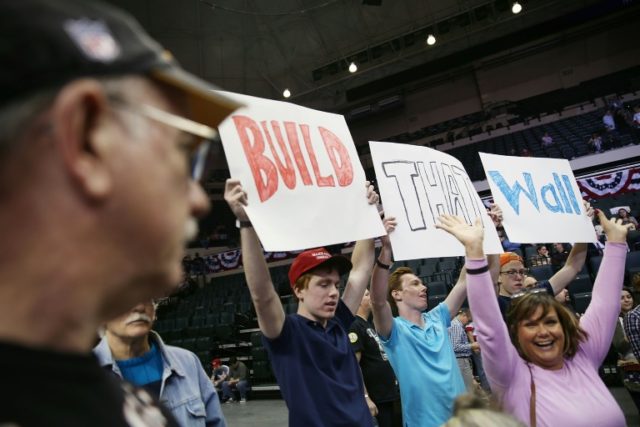A Rasmussen Reports nationwide poll shows that one in three Republicans would be willing to pitch in to pay for a wall on the U.S. southern border with Mexico if Congress fails to give President Donald Trump the $5 billion he has asked Congress to approve for it.
Half of Americans (50 percent) think the U.S. military should be used along the border with Mexico to stop illegal immigration.
A majority of likely voters (52 percent) say illegal immigrants put a “significant strain on the U.S. budget,” while 45 percent say illegal immigration increases the level of serious crime in the country.
“Voters agree the migrant caravans approaching the U.S. southern border through Mexico are a danger to the country and should be stopped at least temporarily,” Rasmussen Reports said of its survey.
The survey results also show a correlation between support for the wall and the president.
“Half (49 percent) of voters who strongly approve of the job Trump is doing would contribute their own money to build the wall if Congress refuses to fund it,” Rasmussen Reports said of its survey. “Just 35 percent of these voters are unwilling to pay any more in taxes to fight illegal immigration.”
Those who don’t like Trump are opposed to donating to the wall funding — 97 percent — while 79 percent don’t want to pay more taxes to get the job done.
Support for the wall and paying for it is strictly divided along party lines, according to the survey, with only ten percent of Democrats saying they would be willing to put their own money toward building a wall.
A larger number of likely voters who are not affiliated with either major party — 21 percent — said they would dig into their own pockets to help secure the border.
But the overall majority of respondents to the online and telephone survey — 69 percent — said they would not want to contribute.
Data from voters who want to build a wall on the U.S. southern border show that 43 percent would contribute their own money, while 39 percent would not. Some 18 percent of those who support a wall are undecided on whether they would spend more of their own money to fund it.
The survey also revealed support based on gender and race.
“Men are more willing than women to privately contribute and pay more in taxes to build the wall and fight illegal immigration,” Rasmussen Reports said of its survey. “Blacks are stronger opponents of both ideas than whites and other minority voters.”
Voters consider illegal immigration a major issue and few Americans believe the federal government is doing enough to address the problem, according to Rasmussen.
“But most voters (56 percent) are not willing to pay anything more in taxes each year to fight illegal immigration,” Rasmussen Reports found. “Nineteen percent (19 percent) are willing to pay an extra $100 each year. Another 19 percent are willing to pay an extra $300 a year or more, with two percent (two percent) who say they would pay more than $1,000 more in taxes each year to fight illegal immigration.”
The survey included asking likely voters about funding other programs, and some put paying to fight global warming ahead of stopping illegal immigration, but the latter did have a slight edge overpaying for socialized medicine.
“Voters are even less willing to pay to fight illegal immigration than they are to pay higher taxes and utility costs to fight global warming,” Rasmussen Reports found. “They’re about equally as likely to pay higher taxes to fight illegal immigration as they are to pay for Obamacare, although voters are slightly more willing to pay an extra $100 a year for the wall than they are for Obamacare.”
“The president has warned that a partial government shutdown is looming following a heated meeting with Democratic leaders in which the two sides failed to come to an agreement over the border wall,” Rasmussen Reports said of its survey. “Voters are getting more enthusiastic about building the wall, but they’re still not willing to risk a shutdown over it.”
The survey of 1,000 likely voters was conducted on December 12 and 13. The margin of sampling error is plus or minus three percent with a 95 percent level of confidence.
Follow Penny Starr on Twitter

COMMENTS
Please let us know if you're having issues with commenting.